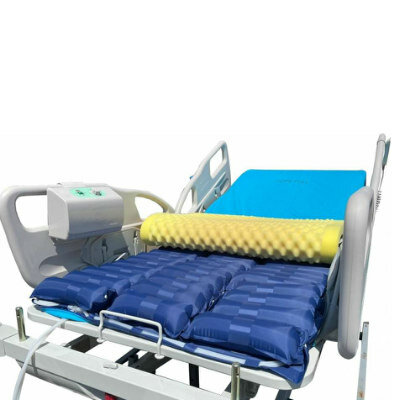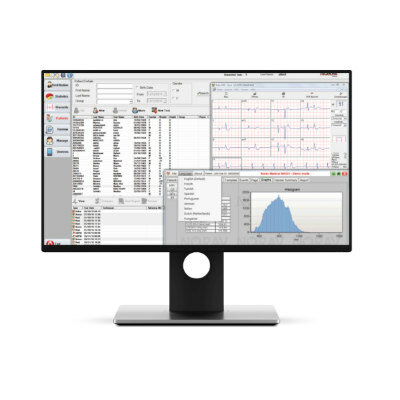AI-Enabled Digital Stethoscope Detects Pregnancy-Related Heart Disease
|
By HospiMedica International staff writers Posted on 10 Jan 2024 |

Peripartum cardiomyopathy, a heart failure condition affecting women in late pregnancy or post-pregnancy, significantly impairs the heart's ability to pump blood. While many recover normal heart function with treatment, it can escalate to severe heart failure in some cases, making early detection vital. However, diagnosis is often challenging as it typically occurs at the end of pregnancy or in the months after, with symptoms mirroring those of normal pregnancy, such as breathlessness and swelling in the feet and legs. Now, new research has revealed that screening for this condition using an AI-powered digital stethoscope in conjunction with an electrocardiogram (EKG) may be twice as effective in detection compared to standard obstetric care, which includes clinical EKGs.
In a study led by Mayo Clinic (Jacksonville, FL, USA) that involved nearly 1,200 Nigerian women, either pregnant or postpartum, researchers found that peripartum cardiomyopathy was identified twice as frequently when EKG tests were conducted using a digital stethoscope equipped with an AI algorithm, as opposed to using clinical EKGs alongside routine obstetric care. Nigeria has the highest reported incidence of peripartum cardiomyopathy worldwide, impacting as many as 1 in 96 pregnancies. The AI screening utilized a digital stethoscope to record the heart's electrical activity and sounds. Women in the AI intervention group also received an initial echocardiogram to confirm the AI algorithm's effectiveness.
The AI-enhanced stethoscope employed an algorithm initially designed for 12-lead EKG data, adapted for use with a single-lead EKG via a digital stethoscope. This adaptation allowed for the prediction of the likelihood of left ventricular dysfunction. The control group underwent traditional EKG tests without the AI digital stethoscope, and health professionals reviewed their results. Echocardiograms were used to measure left ventricular ejection fraction, a key indicator of the heart's pumping efficiency, typically ranging between 55% and 70%. In this study, a left ventricular ejection fraction below 50% was indicative of cardiomyopathy. The AI-enabled stethoscope group had a 4% detection rate of pregnancy-related cardiomyopathy, compared to just 1.8% in the control group. This disparity suggests that standard care might miss about half of all cardiomyopathy cases.
“We demonstrated for the first time in an obstetric population that AI-guided screening using a digital stethoscope improved the diagnosis of this potentially life-threatening and treatable condition,” said lead study author Demilade A. Adedinsewo, M.D., M.P.H. “This research can change current clinical practice from one that is reactive and symptom-driven to a more proactive approach of identifying pregnancy-related cardiac dysfunction using a simple, low-cost and effective screening tool. Earlier diagnosis would facilitate prompt and appropriate management of cardiomyopathy and reduce associated disease and death.”
Related Links:
Mayo Clinic
Latest Critical Care News
- Deep-Learning Model Predicts Arrhythmia 30 Minutes before Onset
- Breakthrough Technology Combines Detection and Treatment of Nerve-Related Disorders in Single Procedure
- Plasma Irradiation Promotes Faster Bone Healing
- New Device Treats Acute Kidney Injury from Sepsis
- Study Confirms Safety of DCB-Only Strategy for Treating De Novo Left Main Coronary Artery Disease
- Revascularization Improves Quality of Life for Patients with Chronic Limb Threatening Ischemia
- AI-Driven Prediction Models Accurately Predict Critical Care Patient Deterioration
- Preventive PCI for High-Risk Coronary Plaques Reduces Cardiac Events
- AI Diagnostic Tool Guides Rapid Diagnosis and Prediction of Sepsis
- World's First AI-Powered Sepsis Alert System Detects Sepsis in One Minute
- Smartphone Magnetometer Uses Magnetized Hydrogel to Measure Biomarkers for Disease Diagnosis
- New Technology to Revolutionize Valvular Heart Disease Care
- Super Permeable Wearable Electronics Enable Long-Term Biosignal Monitoring
- New Hydrogel Features Enhanced Capabilities for Treating Aneurysms and Halting Progression
- New AI Tool Predicts Medical Events to Support Clinical Decision-Making in Healthcare Settings
- Bioelectronic Mesh Grows With Cardiac Tissues for Comprehensive Heart Monitoring
Channels
Artificial Intelligence
view channel
AI-Powered Algorithm to Revolutionize Detection of Atrial Fibrillation
Atrial fibrillation (AFib), a condition characterized by an irregular and often rapid heart rate, is linked to increased risks of stroke and heart failure. This is because the irregular heartbeat in AFib... Read more
AI Diagnostic Tool Accurately Detects Valvular Disorders Often Missed by Doctors
Doctors generally use stethoscopes to listen for the characteristic lub-dub sounds made by heart valves opening and closing. They also listen for less prominent sounds that indicate problems with these valves.... Read moreSurgical Techniques
view channel
Hydrogel-Based Miniaturized Electric Generators to Power Biomedical Devices
The development of engineered devices that can harvest and convert the mechanical motion of the human body into electricity is essential for powering bioelectronic devices. This mechanoelectrical energy... Read moreWearable Technology Monitors and Analyzes Surgeons' Posture during Long Surgical Procedures
The physical strain associated with the static postures maintained by neurosurgeons during long operations can lead to fatigue and musculoskeletal problems. An objective assessment of surgical ergonomics... Read more.jpg)
Custom 3D-Printed Orthopedic Implants Transform Joint Replacement Surgery
The evolving field of 3D printing is revolutionizing orthopedics, especially for individuals requiring joint replacement surgeries where traditional implants fail to provide a solution. Although most people... Read more
Cutting-Edge Imaging Platform Detects Residual Breast Cancer Missed During Lumpectomy Surgery
Breast cancer is becoming increasingly common, with statistics indicating that 1 in 8 women will develop the disease in their lifetime. Lumpectomy remains the predominant surgical intervention for treating... Read morePatient Care
view channel
Surgical Capacity Optimization Solution Helps Hospitals Boost OR Utilization
An innovative solution has the capability to transform surgical capacity utilization by targeting the root cause of surgical block time inefficiencies. Fujitsu Limited’s (Tokyo, Japan) Surgical Capacity... Read more
Game-Changing Innovation in Surgical Instrument Sterilization Significantly Improves OR Throughput
A groundbreaking innovation enables hospitals to significantly improve instrument processing time and throughput in operating rooms (ORs) and sterile processing departments. Turbett Surgical, Inc.... Read more
Next Gen ICU Bed to Help Address Complex Critical Care Needs
As the critical care environment becomes increasingly demanding and complex due to evolving hospital needs, there is a pressing requirement for innovations that can facilitate patient recovery.... Read moreGroundbreaking AI-Powered UV-C Disinfection Technology Redefines Infection Control Landscape
Healthcare-associated infection (HCAI) is a widespread complication in healthcare management, posing a significant health risk due to its potential to increase patient morbidity and mortality, prolong... Read moreHealth IT
view channel
Machine Learning Model Improves Mortality Risk Prediction for Cardiac Surgery Patients
Machine learning algorithms have been deployed to create predictive models in various medical fields, with some demonstrating improved outcomes compared to their standard-of-care counterparts.... Read more
Strategic Collaboration to Develop and Integrate Generative AI into Healthcare
Top industry experts have underscored the immediate requirement for healthcare systems and hospitals to respond to severe cost and margin pressures. Close to half of U.S. hospitals ended 2022 in the red... Read more
AI-Enabled Operating Rooms Solution Helps Hospitals Maximize Utilization and Unlock Capacity
For healthcare organizations, optimizing operating room (OR) utilization during prime time hours is a complex challenge. Surgeons and clinics face difficulties in finding available slots for booking cases,... Read more
AI Predicts Pancreatic Cancer Three Years before Diagnosis from Patients’ Medical Records
Screening for common cancers like breast, cervix, and prostate cancer relies on relatively simple and highly effective techniques, such as mammograms, Pap smears, and blood tests. These methods have revolutionized... Read morePoint of Care
view channel
Critical Bleeding Management System to Help Hospitals Further Standardize Viscoelastic Testing
Surgical procedures are often accompanied by significant blood loss and the subsequent high likelihood of the need for allogeneic blood transfusions. These transfusions, while critical, are linked to various... Read more
Point of Care HIV Test Enables Early Infection Diagnosis for Infants
Early diagnosis and initiation of treatment are crucial for the survival of infants infected with HIV (human immunodeficiency virus). Without treatment, approximately 50% of infants who acquire HIV during... Read more
Whole Blood Rapid Test Aids Assessment of Concussion at Patient's Bedside
In the United States annually, approximately five million individuals seek emergency department care for traumatic brain injuries (TBIs), yet over half of those suspecting a concussion may never get it checked.... Read more
New Generation Glucose Hospital Meter System Ensures Accurate, Interference-Free and Safe Use
A new generation glucose hospital meter system now comes with several features that make hospital glucose testing easier and more secure while continuing to offer accuracy, freedom from interference, and... Read moreBusiness
view channel
Johnson & Johnson Acquires Cardiovascular Medical Device Company Shockwave Medical
Johnson & Johnson (New Brunswick, N.J., USA) and Shockwave Medical (Santa Clara, CA, USA) have entered into a definitive agreement under which Johnson & Johnson will acquire all of Shockwave’s... Read more














